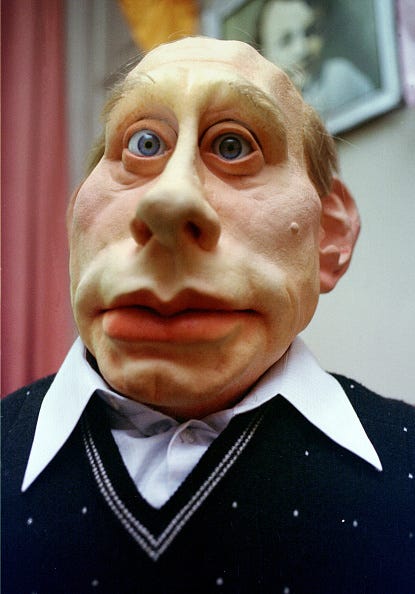It was just a puppet show. What was there to fear?
For eight years, the Russian television program ‘Kukly’ mocked politicians of all stripes, Western and Russian.
By the time Vladimir Putin became president around the turn of the millennium, the show had already been running for six years, skewering the powerful and parodying and the self-important.

The newly-installed occupant of the Kremlin could not tolerate being mocked. Just weeks after his inauguration as president, the show portrayed him as a “evil, muttering baby gnome.”
Putin made a decision: they simply cannot get away with this!
Read on to see how the Russian government strangled the show — and the warning for our times amid the cancellation of Jimmy Kimmel’s program.
Despite wielding immense power, authoritarians turn on comedians first.
“It's parody, it's satire that gets under [Putin’s] skin. And those that he has disliked the most… some of whom he killed… I think it exposes a sign of weakness,” former U.S. Ambassador to Russia Michael McFaul told The Counteroffensive. “If you're really strong and you're really confident, then you don't need to worry about the Jimmy Kimmels of the world.”
What’s funny ultimately comes from a sad truth.
And as we experience a contraction of our political freedoms, one of the first groups of people to point out the hypocrisy are comedians.
There’s no figure more famous in Ukrainian history than Taras Shevchenko, the poet and artist who is a central part of the country’s identity.
In the 19th century, Tsar Nicholas I imprisoned Shevchenko for a satirical poem that — among other offenses — described the Tsar’s wife as a “dried-up mushroom.” The parody was absurd, of course, but it contributed to his imprisonment.
There’s a sort of shared language of dissent in humor, where we can challenge taboos, we can tell off petty autocrats.
“Comedy is effective,” McFaul said. “Because you can say things in a way that communicates things — when it’s just somebody lecturing you… people can tune that out. But comedy can be very effective at exposing some of these problems.’
We could all use a laugh
From our archives:
The dark art of comedy in wartime Ukraine: what was funny and isn’t anymore? Once serious but now hilarious?
In 2001, the Russian state-owned energy Gazprom seized control of the country's only major independent TV network, NTV.
NTV had been the one to air the Kukly comedy show.
Gazprom had made specious and baseless charges of fraud, tax evasion and financial wrongdoing. It wasn’t necessary to prove it — just to have enough mud flung to excuse what they would do next.
The state-owned company purchased up a large share of the television network, and used a shareholder’s meeting to vote in new management in what was described as a ‘coup.’
Despite the efforts of journalists to resist new leadership, and an 11-day barricade, control was wrested from the free press.
The new ownership cut off the final broadcast mid-sentence.
Correspondents quit in droves. The founder of the puppet show ‘Kukly’ was among those who left. His show was shut down not long after.
Some 20,000 protested in Moscow against the dissolution of Russia's primary independent television news broadcaster. But it was in vain — another freedom vanished from Russian society.
There are obvious parallels between Putin’s consolidation of power in the early 2000s and the present day. Kimmel’s cancellation came after Trump’s FCC commission said: “We can do this the easy way or the hard way.
The departure of the comic only emboldened the president. This week, Donald Trump has darkly warned that broadcasting negative stories against him are “illegal.”
“I’m a very strong person for free speech… But 97, 94, 95, 96 percent of the people are against me in the sense of the newscasts are against me. The stories are– they said 97% bad. So… they’ll take a great story, and they’ll make it bad. See, I think that’s really illegal, personally.”
His FCC chairman has said that Jimmy Kimmel’s dismissal is just the start.
"I don't think this is the last shoe to drop,” warned Carr this week.
So: what to do? It's obvious that the Trump administration is acting like any other bully — probing for weak points and easy targets. They don’t want an easy or fair fight. So the Trump administration going after law firms, universities and media institutions that will bend the knee because it’s not worth the trouble.
McFaul warned that as Russia descended into authoritarianism he saw not just the muzzling of a free press, but the self-censorship of those who would just rather not deal with the mess.
The solution for the difficult path ahead is to speak out, to be knowledgeable, to be courageous, to be committed.
It’s incumbent on all of us to try.
Full conversation with former Amb. McFaul at the very top of this newsletter:
0:00: A dangerous global moment
6:30: From Kukly to Kimmel: censorship echoes across regimes
12:00: Why autocrats fear comedians, artists, and satire
17:30: Self-censorship and the bargains that sustained Putin’s system
23:45: Free speech in the U.S. vs. creeping authoritarian habits
30:25: FCC leverage, broadcast TV decline, and the rise of independent media
35:05: Framing the fight: power vs. ideology in autocrats vs. democrats
40:58: Modern autocracy: protecting the guilty, not persecuting the innocent
46:55: Sanctions on Russia: what they can and can’t achieve
56:55: The Russian capacity for absorbing economic suffering
For the nerds! Missile and nuke tech:
In another Substack Live earlier this week, we spoke to Missile Matters’ Fabian Hoffmann. The soon-to-be Ph.D held forth on Ukraine’s missile tech and Europe’s nuclear strategy:
0:00: Kicking off with defense tech and why it’s kind of nerdy
12:27: How Ukraine built up Neptune, Flamingo, and other missile projects
14:19: Sorting out the difference between missiles, rockets, and drones
21:35: NATO, Trump, and the big questions around European nuclear strategy
23:24: How Russia uses nuclear threats
31:03: What tactical nukes are vs. big strategic nukes
34:06: Reasons Putin hasn’t crossed the nuclear line (yet)
36:16: Could Europe ever build its own nuclear arsenal?
49:47: What Trump’s NATO moves mean for Europe and the US
NEWS OF THE DAY:
By: Aidan Stretch
Good morning to readers; Kyiv remains in Ukrainian hands.
EU TIGHTENS SANCTIONS ON RUSSIA UNDER TRUMP PRESSURE: New EU sanctions will curb energy trade with Russia and target Chinese companies buying Russian oil, the New York Times reports.
The package plans to phase out Russian liquefied natural gas purchases by 2027, a year earlier than previously planned. It also includes provisions to pressure Chinese oil traders, petrochemical companies and refineries to stop buying Russian oil.
These measures go part of the way toward the actions demanded by President Trump as a condition for harsher American sanctions on Russia.
RUSSIAN JETS VIOLATE ESTONIAN AIRSPACE: Three Russian jets breached Estonian airspace on Friday, leading Estonia to request NATO Article 4 consultations, per the FT.
The Russian MiG-31 fighter jets breached Estonia’s airspace for 12 minutes before being intercepted and turned back by NATO aircraft. While Russian planes have briefly entered Estonian airspace before, this breach was unusually long.
This is Russia’s third recent violation of EU airspace: last week, Russian drones entered Romanian and Polish airspace—including a deep incursion of at least19 drones into Poland which triggered NATO Article 4. Kaja Kallas, the EU’s top diplomat and former Estonian premier, called this most recent incursion “an extremely dangerous provocation.”
RUSSIAN JETS BUZZ POLISH OIL PLATFORM: The Polish Border Guard accused two Russian jets of flying at low altitude over a Polish oil platform in the Baltic Sea, Militaryni reported. The Polish military said that the Russian planes crossed a no-fly zone defined as a distance of 500m from the platform. This happened the same day as Estonian airspace was violated.
Dog of War:
During dinner with members of The Counteroffensive’s team, this patriotically-collared pup kept a close eye on the safety of the group!
Stay safe out there.
Best,
Tim






